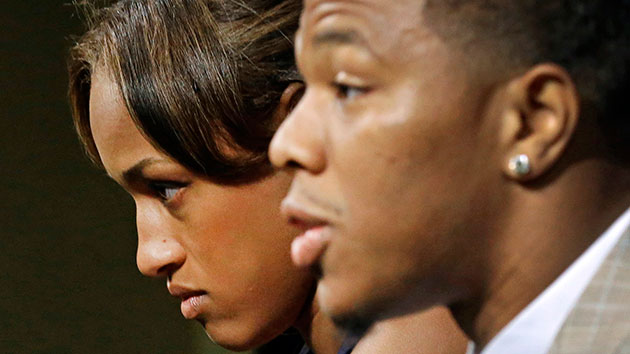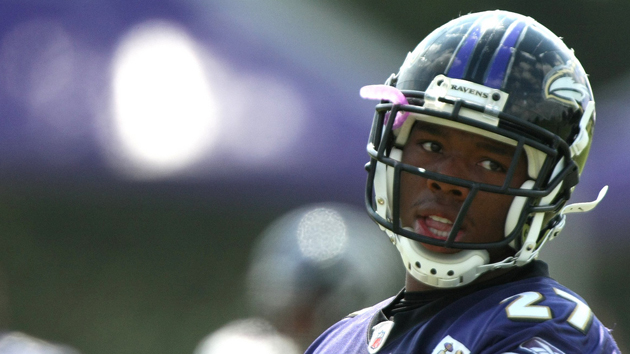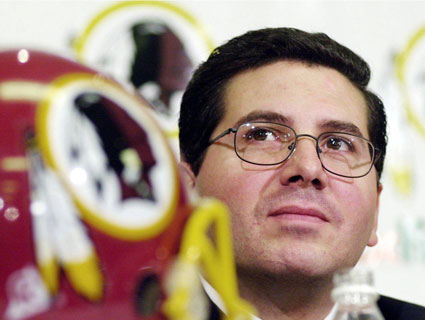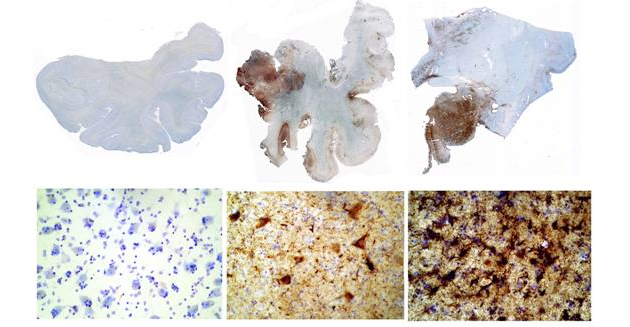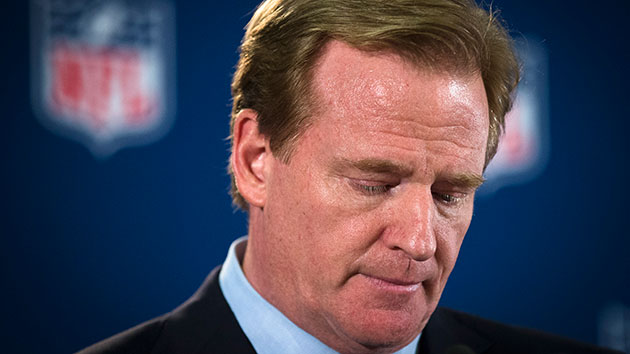
John Minchillo/AP
With the Super Bowl days away, the sports world’s hot-take artists have spent the past week toggling between the intrigue and idiocy of Deflategate to the press conference reticence of Seattle Seahawks star Marshawn Lynch. In some ways, it has been the perfect ending to a dreadful year for the NFL and its commissioner, Roger Goodell.
Famous for his “protect the shield” mantra and disciplinarian ways, Goodell has seen his reputation get battered throughout the controversy-filled 12 months since Super Bowl XLVIII. So, as Ballghazi rages on and the big game approaches, here’s a look back at the recent firestorms and missteps that made 2014 such a rotten year for the league and its commish:
Ray Rice: It was bad enough when the league initially suspended Rice, then the Baltimore Ravens’ star running back, for a paltry two games after his February arrest for assaulting his then-fiancée (now wife) at an Atlantic City casino. It got worse when the Ravens further bungled the situation. But when TMZ released security camera footage in September that actually showed Ray Rice punching Janay Rice, the league had to suspend him indefinitely—even as Goodell maintained that he had never before seen the video. (Numerous reports have made those claims seem laughable.) The NFL toughened its domestic-abuse policies, sure, and will air an ad during the Super Bowl to raise awareness. But the damage from the league’s initial inaction already has been done. As Tracy Treu, the wife of former Oakland Raiders center Adam Treu, told me back in September, “When you’re with an NFL team, the message to you is clear: Don’t fuck anything up for your partner, and don’t fuck anything up for the team.”
Adrian Peterson: Just days after the explosive Rice video was released, the Minnesota Vikings’ All-Pro running back was accused of hitting his four-year-old son with a switch and was indicted for reckless or negligent injury to a child. For a short time it looked like Peterson would be back on the field after missing just a week of work, but the Vikings quickly reversed course, and the NFL ultimately suspended him for the remainder of the season.
Greg Hardy/Jonathan Dwyer: Lost a bit in the Rice and Peterson headlines were the domestic-assault charges against Hardy, a Carolina Panthers defensive end, and Dwyer, an Arizona Cardinals running back. Hardy’s then-girlfriend, Nicole Holder, testified in July that Hardy had dragged her around his apartment, threw her on a futon covered in rifles, and then put his hands on her throat. “I was so scared I wanted to die,” she testified. Hardy was convicted; his appeal is set for February. (He took a paid leave of absence in September, in part to avoid a possible suspension.) Dwyer allegedly head-butted his wife and broke her nose in July. She reportedly went to police after seeing the Peterson news in September and fearing for her child’s safety. Dwyer was put on the reserve/non-football-injury list and pleaded not guilty to charges on Monday.
Concussions: The league’s ongoing concussion scandal may have peaked in 2013 with the airing of the Frontline documentary League of Denial, but the issue of player safety—indeed, the long-term viability of the game—isn’t going away anytime soon. In July, a federal judge preliminarily approved a settlement between the league and former players over concussion-related claims. Since then, more than 200 players have opted out of the settlement, objecting to the restrictions embedded in the deal. As ESPN the Magazine‘s Peter Keating wrote, “Fewer than 3,600 athletes, or about 17 percent of all retired players, will end up with some kind of illness that the settlement will compensate, according to forecasts by both sides in the case.” (The settlement is still awaiting final approval.) Next up: the Christmas release of Will Smith’s Concussion, a feature film based on a GQ profile of neuropathologist Dr. Bennet Omalu, one of the first physicians to fight the NFL on brain trauma.
Dan Snyder and the Washington [Redacted]: We’ve already covered many of the dumb things Snyder has said in recent months. Even after 50 US senators called on the Washington owner to change his team’s name, the team still managed to start something called the Original Americans Foundation and continue to be completely tone deaf on social media. The Native American-led protests against the name will continue into this weekend in Arizona.
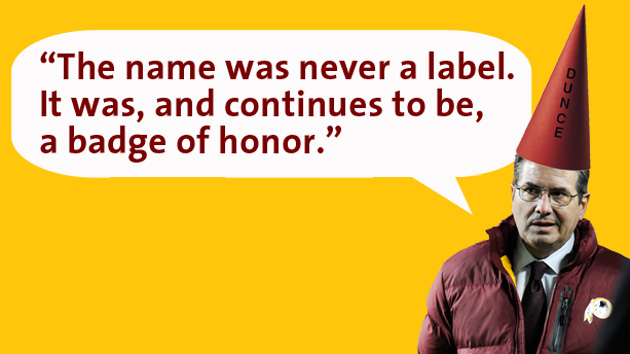
Cheerleading lawsuits: If you haven’t read my colleague Julia Lurie’s roundup of the many lawsuits brought by current and former cheerleaders against NFL teams, go do that now. Here’s an excerpt, about how different teams determine whether their cheerleaders are fit enough to perform:
The Jills allege being subjected to a weekly “jiggle test,” which consisted of doing jumping jacks while their stomachs, arms, legs, hips, and butts were scrutinized. (The Jills manual also instructs, “Never eat in uniform unless arrangements have been made in advance. Just say ‘Thanks so much for offering but no thank you’…NEVER say, ‘Oh, we’re not allowed to eat!'”) Ben-Gals are required to weigh in twice a week, and if they come in more than three pounds over their “goal weight,” they face penalties: extra conditioning after practice, benchings, probation, or dismissal from the team.
Aaron Hernandez trial: Hernandez, the former Patriots tight end who was arrested a year and a half ago for the shooting death of friend Odin Lloyd, is back in the news now that the jury has been selected and his murder case is set to start Thursday in Connecticut. Hernandez also has been charged with two more murder counts for a July 2012 double-murder in Massachusetts.
Anti-gay front offices: Linebacker Michael Sam came out as gay before the NFL Draft last February. No one knew for sure how it would play out—or what effect it would have on Sam’s draft status—but a Sports Illustrated story that anonymously quoted general managers and front-office types around the league wasn’t exactly welcoming. “I don’t think football is ready for [an openly gay player] just yet,” said one personnel assistant. “In the coming decade or two, it’s going to be acceptable, but at this point in time it’s still a man’s-man game.” Sam was drafted in the seventh round by the St. Louis Rams but was cut just before the season began. (After latching on with the Dallas Cowboys’ practice squad for a spell, he’s once again a free agent, albeit an engaged one.)
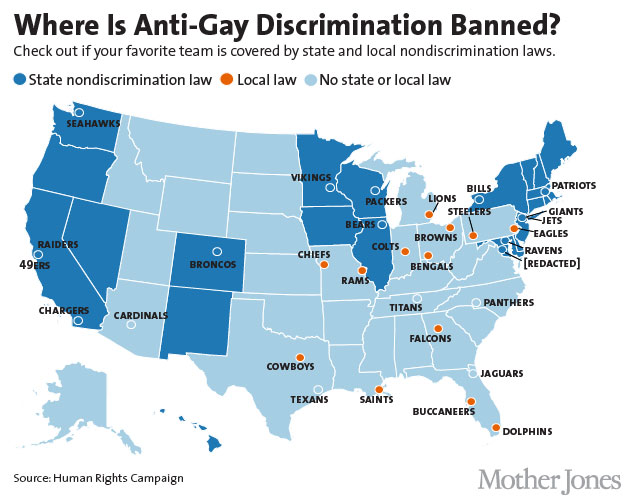
Jim Irsay: The Indianapolis Colts’ billionaire owner was charged with driving while intoxicated in October; he later admitted to having hydrocodone, oxycodone, and Xanax in his system. (Police said they found “numerous prescription medication bottles containing pills,” as well as $29,000 in cash, in Irsay’s car.) The NFL suspended the outspoken 55-year-old for six games and fined him $500,000.
Goodell’s salary: As of 2012, according to tax forms, the Commish was making $44.2 million a year. (Yes, the NFL is still a nonprofit.)
Not so super: While Super Bowl XLIX could break the TV ratings record, Mina Kimes reports in the latest ESPN the Magazine that the mayor of Glendale, Arizona—this year’s host site—told her, “I totally believe we will lose money on this.”
Jameis Winston on the horizon: If all of this weren’t enough, this spring’s NFL Draft will surely be all about Winston, the presumptive No. 1 pick and Heisman Award winner who was accused (but never charged) of rape as a Florida State freshman in 2012. Winston was recently cleared of violating FSU’s code of conduct, though a 2013 New York Times report alleged that “there was virtually no investigation at all, either by the police or the university,” after the allegations were made. The story isn’t going away anytime soon: Last week, Winston’s accuser went public in The Hunting Ground, a documentary on campus sexual assault that debuted Friday at the Sundance Film Festival.

